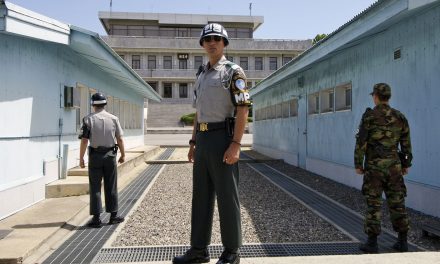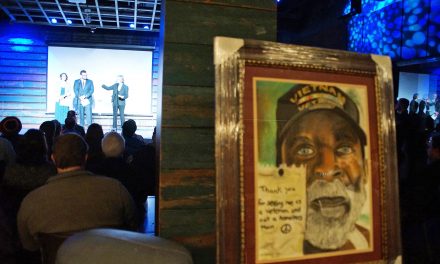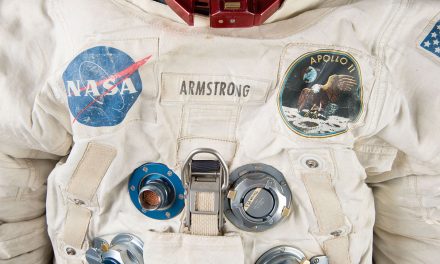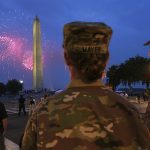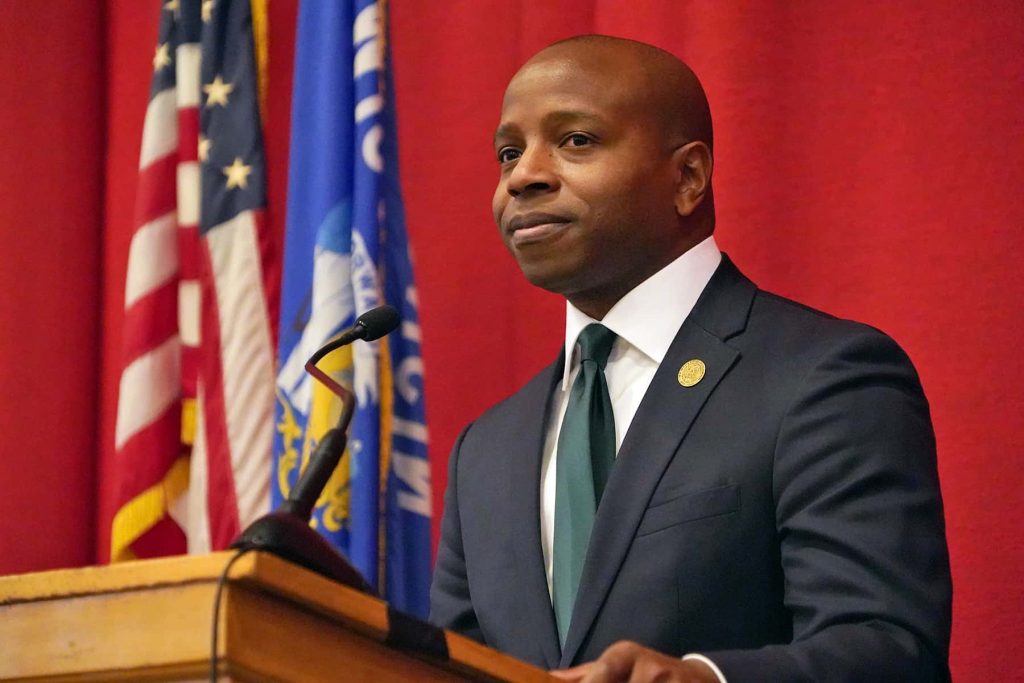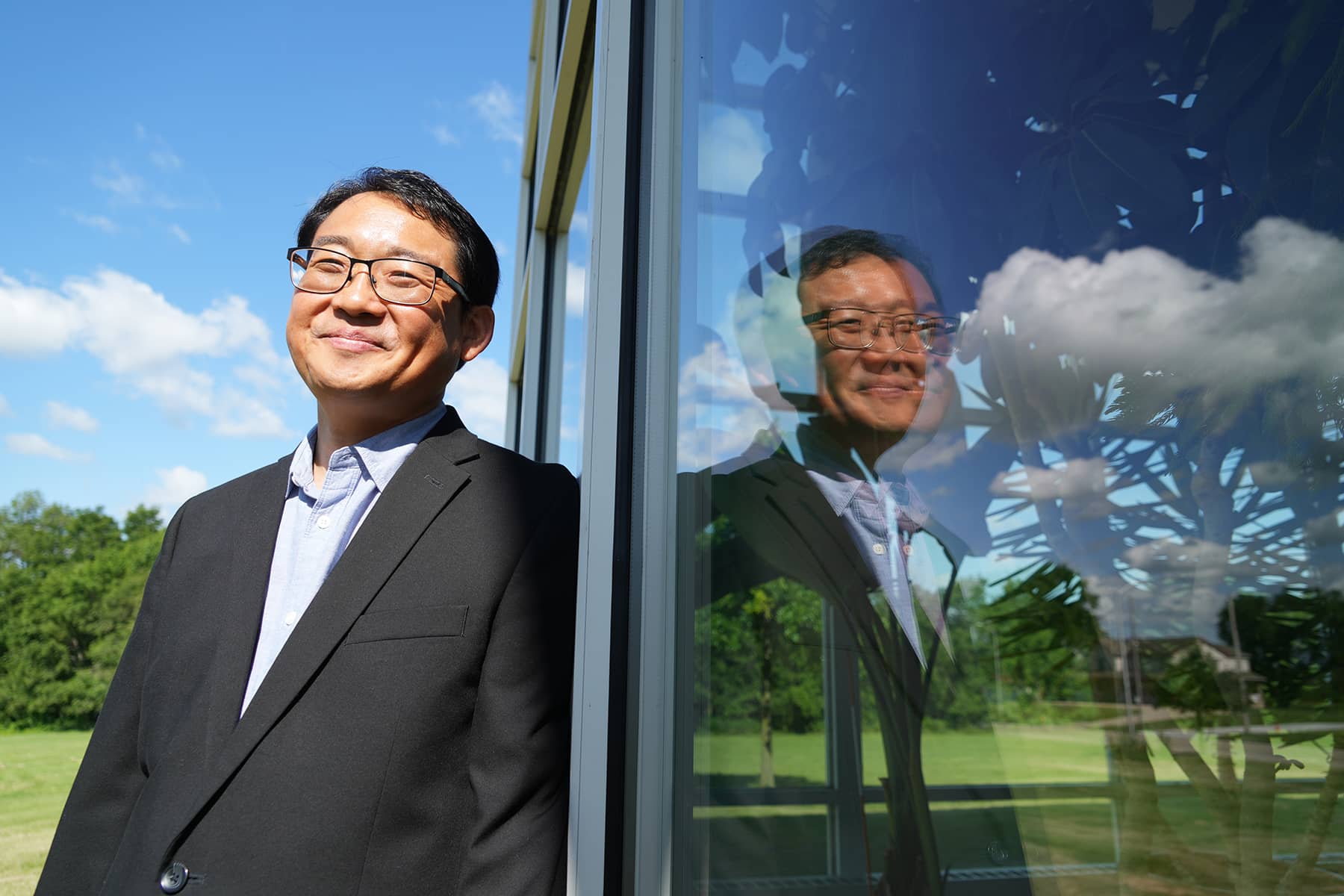
Faith plays a crucial role in Milwaukee’s Korean American community, with churches and the congregational environment helping to keep members connected to their heritage. As a Korean immigrant in the United States himself, Pastor Heechang Kang guides others on their faith journey to reconcile spiritual beliefs with the daily reality of living in an American culture.
Kang embraced his faith far from Wisconsin, in a small city within Gyeonggi Province near Seoul, South Korea. The area around his home was characterized by its beautiful lakes and close-knit community, providing a scenic backdrop for his childhood.
“It was a beautiful city, very similar to Milwaukee. We had lakes on three sides like a peninsula, and it was the resource for drinking water for Seoul,” said Kang. “I have good memories of my hometown, it was a wonderful part of my youth. The people living there prefer not to move to any other city because it’s such a good place.”
Growing up in Korea during the late 1980s and early 1990s, Kang’s childhood was filled with recreational activities outside, a contrast to the technology-driven pastimes of today.
“We didn’t really play water sports on the lakes. People weren’t very big on things like skiing. We just played outside, something that seems especially simple but that was long before the internet,” said Kang. “After school we enjoyed traditional Korean children’s games like freeze tag, hide and seek, and even ‘Ojingeo Geim (오징어 게임),’ which in English translates to ‘Squid Game,’ like in the Netflix drama. But our version was just fun, and everyone survived. Those were common activities for kids in South Korea at that time.”
Kang’s family history followed the familiar struggles of Korean people during the Japanese occupation, and later the Korean War. His grandfather was sent to Japan as forced labor, a common fate for many Koreans during those years. But despite the hardships, Kang’s grandfather held a surprising view of the Japanese people.
“My grandfather worked in Japan for a long time and it was difficult for him. But yet he still spoke well of the Japanese people, saying they were diligent and honest. He grew up under the Japanese rule of Korea, so he saw the average people were not like the military,” said Kang. “But I struggled a lot with my feelings about Japan growing up, and even now at times. When I was little, I did not understand everything. But I did not feel good about Japanese people, I know they did something bad to us. As I got older, especially with a Christian foundation, I learned about reconciliation. History doesn’t change, but how we respond to it does. So while there are times when it is hard to forget, I believe we must be forgiving and move forward together.”
The emotional legacy of Korea’s complex history continues to influence Kang and many Korean Americans to this day. As for a personal influence, the pivotal figure in Kang’s early life was his father, a devout Christian who instilled in him the values of hard work, education, and faith. He had a high level of education and loved to read books and newspapers every day, especially learning new terminologies.
“From him, I learned about the importance of studying and living a responsible life, despite our family’s financial difficulties,” said Kang. “He taught me diligence and strong Christian values, in particular how to develop my relationship with God. I still recall his teachings, and I try to pass them on to my own children.”
His family operated a rice mill in South Korea, using traditional methods. It was originally used for refining rice, but in modern days it was utilized for making rice cakes. Farmers would bring their rice to the mill to be soaked in water for hours, then ground into rice flour. That powder was then mixed with ingredients to form a dough, which was shaped and steamed to make traditional Korean rice cakes, like tteokbokki.
“My father ran the mill, and I learned a lot from him about working with people and providing for others,” said Kang. “He was born during the Korean civil war, so he was very young during that time. I don’t know much about how the war directly affected our family, but I do remember stories about the hardship of food shortages and the struggle for survival after the war.”
Kang also remembered the 1988 Olympic Games in Seoul as a turning point for South Korea’s future, concerning the influence of the military. Before the Olympics, South Korea was heavily militarized, with leaders often using authoritarian methods to push the nation forward. Leaders like President Park Chung-hee brought both rapid development and harsh authoritarian rule.
The Olympics were used for political purposes, and the country made considerable investments to prepare for the event, which helped the economy. The military had a strong grip on the nation, but after the 1990s – especially with the rise of democratic movements – their political power began to diminish.
“Although South Korea became more democratic and free after the Olympics, elements of military culture, combined with Confucian hierarchical traditions, still persisted in society. While the military’s direct influence has waned, the lingering effects of top-down control are still felt, particularly in the workplace and other aspects of daily life,” said Kang. “Some people look back with mixed feelings, recognizing the economic advancements but also the repression that came with it. Over time, as South Korea embraced democracy, the society experienced greater freedom, though concerns remain that certain authoritarian tendencies might resurface.”
Against the backdrop of his everyday life, Kang always felt a spiritual calling. He experienced encounters with the Lord personally and felt a sense of God’s love. As his school years passed, he became determined to express his love for God through his career choice.
While he continued his studies and became more involved with church ministry, Kang considered his options. He felt called to become a pastor, but during his teen years he had observed the dark side of Korean churches.
Those experiences left him wanting to leave South Korea, which also fit with his desire to become a missionary.
“I decided to study theology because I wanted to become a missionary. Many people advised me that if I wanted to become a missionary, I needed language training and cultural experience, so I chose to study in America,” said Kang. “I came to Chicago in 2003 and attended McCormick Theological Seminary, where I had a good experience. However, the language barrier was a huge challenge for me, so I decided to continue my studies, eventually earning a PhD.”
When he attended an American church for his ordination, people were very generous and Kang was welcomed. But listening to sermons in English was still a bit unsettling, and fitting into the church community was not an easy task.
After completing his PhD, Kang secured a green card to begin working and did not have to wait long. He received an unexpected call from a Southern Baptist church in Pensacola, Florida, a city with a strong military presence.
“Despite having no Baptist background, I decided to go there. The church was unique, serving a congregation primarily made up of elderly Korean grandmothers, most of whom were widows who had married American soldiers,” said Kang. “These women had formed a tight-knit Korean community, having lived through difficult times together as military wives. Because of the diverse backgrounds within the congregation, all services – including worship, Bible study, and meetings – were conducted bilingually, which was a new experience for me.”
Kang was often told that serving at immigrant churches was more challenging than traditional Korean churches. He found that to be true, especially in a military community. A year later, the financial and housing crisis coincided with an enticing job offer in Milwaukee.
“When I moved to this church in Milwaukee, I learned that in the 1970s and 1980s there were many Korean women in the congregation who faced significant societal challenges. They had been married to American soldiers, which can be a sensitive topic within the Korean community,” said Kang. “These women often fell into three categories: those who were stigmatized due to their association with soldiers, those who had met their husbands through more conventional dating, and those who came to the U.S. for study or work.”
Regardless of the conditions, the women all unfortunately faced discrimination, not only in the Milwaukee and Korean American communities but also within their own families. That was particularly true for those women who married African American soldiers, as their mixed-race children faced additional challenges.
“I also discovered the deep connections between Milwaukee and the Korean War, particularly in the South Milwaukee area. I attended a funeral service once for a Korean War veteran, which highlighted the historical ties between this community and Korea,” said Kang.
The long winters and working-class environment in Milwaukee reminded Kang of Korea, and it helped him understand why so many people from the area – and around Wisconsin – had participated in the Korean War.
“When immigrants come to the U.S., most people end up doing the same kind of thing, like working three jobs or operating a convenience shop. This leads to a kind of anger and frustration because, back in Korea, they had higher positions,” said Kang. “But here, they feel they don’t have the same status. The church becomes an easy way to gain a title like ‘elder’ or ‘deacon,’ which is why Korean society remains very hierarchical, while American culture is more egalitarian.”
Kang said that the Korean American church had historically focused on serving immigrant communities. However, many of those churches had little direct connection with the local community or other American churches, which created too much isolation. He believed it was crucial for Korean churches in Milwaukee, and other cities around America, to build relationships beyond their own community to avoid becoming an island.
“I believe that the church should function like a missionary. Immigrant churches, especially, need to build relationships with the local community and other places of worship to grow and thrive,” said Kang. “Isolation is not the way forward. I hope the Korean American church can learn from American churches and vice versa, so we can support each other and fulfill our mission as God’s people.”
One of the ways an immigrant church can live, grow up, and do good work is by building relationships with stronger local church communities. Regardless of race, ethnicity, or economic status, if it is a church of God, Kang said that people can do something together. It would be very challenging, but was necessary to avoid the detriments that follow isolation. It was important to open the door to the second generation to have relationships with American neighbors.
One unhealthy side effect of isolation could be seen in the “prosperity gospel,” as it is called in the United States. The doctrine is similar to what was seen in Korea during the 1960s, 1970s, and 1980s. At that time, Korea was rapidly developing but still very poor. Churches often promoted a form of evangelism that emphasized prosperity. The message was that if people came to church, they could become healthier, and wealthier, and their children could achieve success.
While his encounters with racism in America were not always overt, Kang still felt them in small ways, like when ordering food at McDonald’s or KFC. Kang was aware that people would look at him differently, or react harshly because of his accent. They would ignore his complaints, being unwilling to take a moment to listen.
“It was small things, but I felt them. I’ve accepted that I’m different, and I try not to let it bother me. But when it comes to my children, I worry more,” said Kang. “They were born here and speak Korean well, but they still experience racism in subtle ways too, like in school. One time, a substitute teacher made a comment about Asian people and it was hurtful. We discussed it with the school, but the experience left a mark.”
Strengthened by his faith, Kang still expressed hope for the future, for his children, and for the Korean American community in Milwaukee. He envisions a day on the horizon when the younger generation could embrace both their Korean and American identities. They would have the social freedom to use that duality as a source of strength.
“I hope my children can challenge themselves more and not fear trying something new. I teach them that they are not just half American and half Korean, they are 100% American and 100% Korean,” Kang added. “They have a double portion, and with that comes more responsibility, not only to America but also to Korea. They should live with a sense of calling in both cultures.”
- Exploring Korea: Stories from Milwaukee to the DMZ and across a divided peninsula
- A pawn of history: How the Great Power struggle to control Korea set the stage for its civil war
- Names for Korea: The evolution of English words used for its identity from Gojoseon to Daehan Minguk
- SeonJoo So Oh: Living her dream of creating a "folded paper" bridge between Milwaukee and Korean culture
- A Cultural Bridge: Why Milwaukee needs to invest in a Museum that celebrates Korean art and history
- Korean diplomat joins Milwaukee's Korean American community in celebration of 79th Liberation Day
- John T. Chisholm: Standing guard along the volatile Korean DMZ at the end of the Cold War
- Most Dangerous Game: The golf course where U.S. soldiers play surrounded by North Korean snipers
- Triumph and Tragedy: How the 1988 Seoul Olympics became a battleground for Cold War politics
- Dan Odya: The challenges of serving at the Korean Demilitarized Zone during the Vietnam War
- The Korean Demilitarized Zone: A border between peace and war that also cuts across hearts and history
- The Korean DMZ Conflict: A forgotten "Second Chapter" of America's "Forgotten War"
- Dick Cavalco: A life shaped by service but also silence for 65 years about the Korean War
- Overshadowed by conflict: Why the Korean War still struggles for recognition and remembrance
- Wisconsin's Korean War Memorial stands as a timeless tribute to a generation of "forgotten" veterans
- Glenn Dohrmann: The extraordinary journey from an orphaned farm boy to a highly decorated hero
- The fight for Hill 266: Glenn Dohrmann recalls one of the Korean War's most fierce battles
- Frozen in time: Rare photos from a side of the Korean War that most families in Milwaukee never saw
- Jessica Boling: The emotional journey from an American adoption to reclaiming her Korean identity
- A deportation story: When South Korea was forced to confront its adoption industry's history of abuse
- South Korea faces severe population decline amid growing burdens on marriage and parenthood
- Emma Daisy Gertel: Why finding comfort with the "in-between space" as a Korean adoptee is a superpower
- The Soul of Seoul: A photographic look at the dynamic streets and urban layers of a megacity
- The Creation of Hangul: A linguistic masterpiece designed by King Sejong to increase Korean literacy
- Rick Wood: Veteran Milwaukee photojournalist reflects on his rare trip to reclusive North Korea
- Dynastic Rule: Personality cult of Kim Jong Un expands as North Koreans wear his pins to show total loyalty
- South Korea formalizes nuclear deterrent strategy with U.S. as North Korea aims to boost atomic arsenal
- Tea with Jin: A rare conversation with a North Korean defector living a happier life in Seoul
- Journalism and Statecraft: Why it is complicated for foreign press to interview a North Korean defector
- Inside North Korea’s Isolation: A decade of images show rare views of life around Pyongyang
- Karyn Althoff Roelke: How Honor Flights remind Korean War veterans that they are not forgotten
- Letters from North Korea: How Milwaukee County Historical Society preserves stories from war veterans
- A Cold War Secret: Graves discovered of Russian pilots who flew MiG jets for North Korea during Korean War
- Heechang Kang: How a Korean American pastor balances tradition and integration at church
- Faith and Heritage: A Pew Research Center's perspective on Korean American Christians in Milwaukee
- Landmark legal verdict by South Korea's top court opens the door to some rights for same-sex couples
- Kenny Yoo: How the adversities of dyslexia and the war in Afghanistan fueled his success as a photojournalist
- Walking between two worlds: The complex dynamics of code-switching among Korean Americans
- A look back at Kamala Harris in South Korea as U.S. looks ahead to more provocations by North Korea
- Jason S. Yi: Feeling at peace with the duality of being both an American and a Korean in Milwaukee
- The Zainichi experience: Second season of “Pachinko” examines the hardships of ethnic Koreans in Japan
- Shadows of History: South Korea's lingering struggle for justice over "Comfort Women"
- Christopher Michael Doll: An unexpected life in South Korea and its cross-cultural intersections
- Korea in 1895: How UW-Milwaukee's AGSL protects the historic treasures of Kim Jeong-ho and George C. Foulk
- "Ink. Brush. Paper." Exhibit: Korean Sumukhwa art highlights women’s empowerment in Milwaukee
- Christopher Wing: The cultural bonds between Milwaukee and Changwon built by brewing beer
- Halloween Crowd Crush: A solemn remembrance of the Itaewon tragedy after two years of mourning
- Forgotten Victims: How panic and paranoia led to a massacre of refugees at the No Gun Ri Bridge
- Kyoung Ae Cho: How embracing Korean heritage and uniting cultures started with her own name
- Complexities of Identity: When being from North Korea does not mean being North Korean
- A fragile peace: Tensions simmer at DMZ as North Korean soldiers cross into the South multiple times
- Byung-Il Choi: A lifelong dedication to medicine began with the kindness of U.S. soldiers to a child of war
- Restoring Harmony: South Korea's long search to reclaim its identity from Japanese occupation
- Sado gold mine gains UNESCO status after Tokyo pledges to exhibit WWII trauma of Korean laborers
- The Heartbeat of K-Pop: How Tina Melk's passion for Korean music inspired a utopia for others to share
- K-pop Revolution: The Korean cultural phenomenon that captivated a growing audience in Milwaukee
- Artifacts from BTS and LE SSERAFIM featured at Grammy Museum exhibit put K-pop fashion in the spotlight
- Hyunjoo Han: The unconventional path from a Korean village to Milwaukee’s multicultural landscape
- The Battle of Restraint: How nuclear weapons almost redefined warfare on the Korean peninsula
- Rejection of peace: Why North Korea's increasing hostility to the South was inevitable
- WonWoo Chung: Navigating life, faith, and identity between cultures in Milwaukee and Seoul
- Korean Landmarks: A visual tour of heritage sites from the Silla and Joseon Dynasties
- South Korea’s Digital Nomad Visa offers a global gateway for Milwaukee’s young professionals
- Forgotten Gando: Why the autonomous Korean territory within China remains a footnote in history
- A game of maps: How China prepared to steal Korean history to prevent reunification
- From Taiwan to Korea: When Mao Zedong shifted China’s priority amid Soviet and American pressures
- Hoyoon Min: Putting his future on hold in Milwaukee to serve in his homeland's military
- A long journey home: Robert P. Raess laid to rest in Wisconsin after being MIA in Korean War for 70 years
- Existential threats: A cost of living in Seoul comes with being in range of North Korea's artillery
- Jinseon Kim: A Seoulite's creative adventure recording the city’s legacy and allure through art
- A subway journey: Exploring Euljiro in illustrations and by foot on Line 2 with artist Jinseon Kim
- Seoul Searching: Revisiting the first film to explore the experiences of Korean adoptees and diaspora























